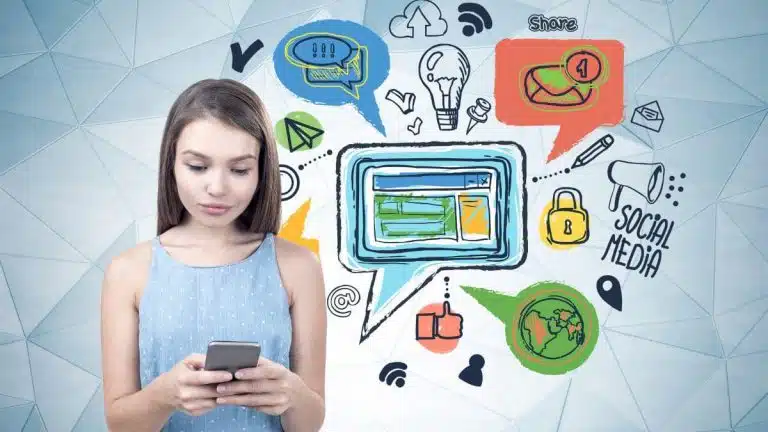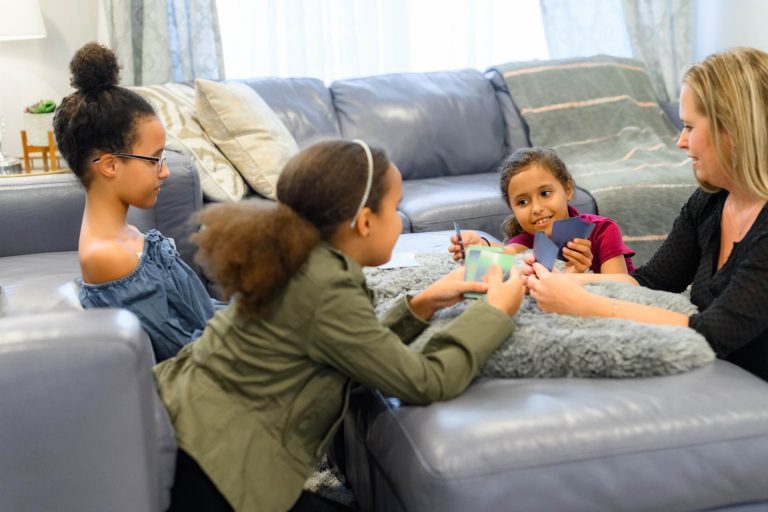Social Media’s Impact on Teen Mental Health: Tips for Responsible Use



Social media has become an integral part of the lives of many teenagers. According to a 2018 survey by the Pew Research Center, 97% of teenagers use at least one social media platform, with 45% being online almost constantly. While social media offers numerous benefits, it also poses certain risks and challenges for teenagers’ mental health.
Also check out our extensive guide about Responsible Use Of Social Media For Children.
In this article, we will explore the impact of social media on teenagers’ mental well-being, examining both the positive and negative aspects. We will also provide tips on how parents can help their teens navigate social media responsibly and protect their mental health.
One of the key benefits of social media for teenagers is the ability to create online identities and build social networks. For many teens, social media platforms like Facebook, Instagram, and Snapchat provide an avenue for connecting with peers, making new friends, and seeking support. This is particularly important for teenagers who may experience exclusion or have disabilities or chronic illnesses. Social media can offer them a sense of belonging and support, creating a virtual community that understands and empathizes with their challenges.
Adolescents utilize social media not only for entertainment but also as a means of self-expression. Platforms like YouTube allow them to share videos showcasing their talents, interests, and creativity. Social media can provide an outlet for self-expression and allow teens to explore their identities in a safe and supportive environment. Additionally, social media exposes teenagers to current events, allowing them to stay informed about important issues and engage in discussions on various topics, including healthy behaviors.
In some cases, social media can positively impact teenagers’ mental health. Platforms that offer humorous or distracting content and foster meaningful connections with peers and a vast social network may help teens avoid depression and feelings of isolation. Engaging with others and forming relationships online can boost self-esteem and provide a sense of belonging, which are crucial for overall well-being.

While social media has benefits, excessive use can also adversely affect teenagers’ mental health. One common issue is distraction. Spending too much time on social media can distract teens from essential activities such as schoolwork, hobbies, and maintaining face-to-face relationships. It can disrupt their daily routines, including sleep patterns, leading to sleep deprivation and fatigue. Lack of quality sleep can have a detrimental impact on mental health, contributing to increased levels of stress, anxiety, and even depression.
Engaging with social media also brings forth a noteworthy peril – the vulnerability to bullying and the rapid dissemination of rumors. The online environment can provide a platform for individuals to engage in harmful behaviors, such as cyberbullying, which can have severe psychological consequences for the victims. Teens may also encounter rumors or false information that can damage their reputations or cause emotional distress. The constant pressure to conform to social norms and the fear of missing out on social events can lead to heightened anxiety and peer pressure among teenagers.
Social media often presents an idealized version of other people’s lives, leading teenagers to develop unrealistic views of their own lives and bodies. Constant exposure to carefully curated images and posts can create a distorted perception of reality, fostering feelings of inadequacy and low self-esteem. Teenagers may compare themselves to peers and feel pressured to fit in or achieve a certain standard, contributing to anxiety and depression.

Various studies have explored the relationship between social media use and teenagers’ mental health. A survey conducted in 2019 involving more than 6,500 12- to 15-year-olds in the U.S. found that those who spent more than three hours a day on social media were at a heightened risk for mental health problems. Another study conducted in England with over 12,000 13- to 16-year-olds revealed that using social media more than three times a day predicted poor mental health and well-being in teens.
Additional studies have observed links between high levels of social media use and symptoms of depression and anxiety. A 2016 study with over 450 teens found that greater social media use, particularly at night, and emotional investment in social media were associated with worse sleep quality, higher levels of anxiety, and depression. This suggests that how teenagers use social media, such as passively scrolling through others’ content or seeking validation through feedback, can influence its impact on mental health.

Individual factors and circumstances can also influence the impact of social media on teenagers’ mental health. For instance, a study conducted in 2015 found that social comparison and feedback-seeking behavior on social media were linked with depressive symptoms in teenagers. However, teenagers who actively interacted with others or posted their content did not experience the same declines in life satisfaction. This suggests that how teenagers engage with social media plays a significant role in determining its impact on their mental well-being.

While social media can pose risks, there are steps that parents can take to encourage responsible use and mitigate some of the adverse effects. Here are some tips:
Having open and honest conversations with your teen about how to avoid excessive social media use is crucial. Please encourage them to balance their online activities with other vital aspects of life, such as hobbies, physical activities, and face-to-face interactions. Create a nightly ritual that steers clear of electronic devices and keeps cellphones and tablets away from the bedrooms. Lead by example and follow these rules yourself to set a positive precedent.
Let your teen know that you will periodically check their social media accounts. This not only helps you stay informed about their online activities but also sends a message that you are actively involved and care about their well-being. Be consistent with your monitoring efforts, and make sure to follow through on your commitment.
Teach your teen about the importance of responsible online behavior. Discourage gossiping, spreading rumors, bullying, or damaging someone’s reputation, both online and offline. Discuss what is appropriate and safe to share on social media and emphasize respecting others’ privacy. Encourage your teen to think before posting and consider the potential consequences of their actions.
While social media can provide a sense of connection, face-to-face interactions should remain the same. Encourage your teen to engage in activities that involve direct contact with friends, such as sports, hobbies, or group outings. This holds particular significance for teenagers who are susceptible to social anxiety disorder. Balancing online and offline relationships can help foster healthier social connections and reduce the negative impact of social media.
Maintain open lines of communication with your teen about their social media habits. Ask them how they use social media and how it makes them feel. Encourage them to talk about any concerns or issues they may be experiencing online. By creating a safe and non-judgmental space for discussion, you can better understand their experiences and provide guidance when needed.
Help your teen develop a critical eye toward the images and posts they encounter on social media. Remind them that what they see online often represents an idealized version of reality. Encourage them to focus on their strengths and achievements rather than compare themselves to others. Promoting self-acceptance and a healthy self-image can help shield your teen from the harmful effects of social comparison.

If you suspect your teen is experiencing signs or symptoms of anxiety or depression related to social media use, it is crucial to seek professional help. Discuss your concerns with your child’s healthcare provider, who can provide guidance and appropriate interventions. Mental health professionals can offer strategies to help your teen manage their social media use and cope with any emotional challenges they may face.
In conclusion, social media has both positive and negative effects on teenagers’ mental health. While it can provide opportunities for connection, self-expression, and support, excessive use and exposure to harmful content can lead to distractions, sleep disruption, bullying, and unrealistic views of oneself. By promoting responsible use of social media, open communication, and a healthy self-image, parents can help their teens navigate the online world while safeguarding their mental well-being.
Social media can have both positive and negative effects on teenagers’ mental well-being. While it offers opportunities for social connections, support, and self-expression, excessive use can lead to distractions, sleep disruption, exposure to harmful content, and unrealistic social comparisons, contributing to anxiety and depression.
Social media allows teenagers to create online identities, build social networks, and connect with peers, which can be particularly important for those who may feel excluded or have disabilities. Additionally, it provides a platform for entertainment, self-expression, and staying informed about current events and healthy behaviors.
Parents can encourage responsible social media use by setting reasonable limits on screen time, engaging in open communication about online activities, and monitoring their teens’ accounts. It is essential to educate teenagers about online etiquette, the potential consequences of their actions, and the importance of balancing online and offline relationships.
Yes, excessive social media use can disrupt teenagers’ sleep patterns, leading to sleep deprivation and fatigue. Spending too much time on social media, especially before bedtime, can negatively impact sleep quality, contributing to higher levels of stress, anxiety, and depression.
Teenagers should be encouraged to report cyberbullying and harmful rumors to trusted adults or platform administrators. Promoting a positive online environment that discourages such behavior and educating teenagers about respecting others’ privacy can help reduce the incidence of cyberbullying and rumors.
If parents notice signs of anxiety or depression in their teens related to social media use, they should seek professional help. Discussing concerns with a healthcare provider or mental health professional can lead to appropriate interventions and strategies to manage social media use and address emotional challenges.
Parents can help teenagers develop a healthy self-image by encouraging them to focus on their strengths and achievements rather than comparing themselves to others online. Reminding teens that social media often portrays an idealized version of reality can also foster a more realistic perception of themselves and reduce feelings of inadequacy.
Yes, in some cases, social media can have a positive impact on teenagers’ mental well-being. Platforms that promote meaningful connections and provide humor and distraction can help teens avoid feelings of isolation and depression. Engaging with others online can boost self-esteem and create a sense of belonging, contributing to overall mental health.
Parents can strike a balance by setting reasonable limits on social media use, encouraging face-to-face interactions, and promoting open communication about online experiences. Being actively involved in their teens’ online activities and modeling responsible social media use can also help protect their mental well-being.

12 fun indoor games for kids of all ages. Keep your kids entertained and engaged without screens. Perfect for rainy days or family game nights, with little to no preparation required.